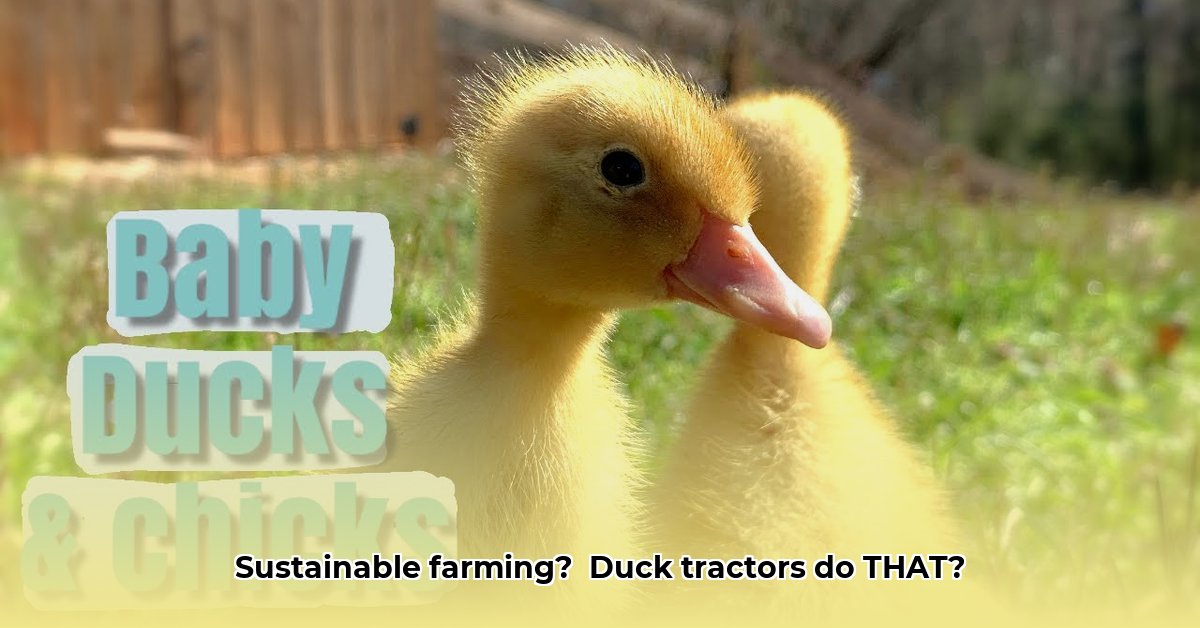
Duck Tractor Farming: A Sustainable Approach
Want to boost your farm's profitability and environmental sustainability? Integrating ducks into your farming operation, creating a "duck tractor," offers a surprisingly effective and enjoyable solution. This guide details how this natural pest control and fertilization system can revolutionize your practices. We'll explore the practical steps, benefits, and considerations involved in successfully implementing duck tractor farming. Learn more about farm supplies and benefits.
The Amazing Pest Control Power of Ducks
Ducks are voracious eaters of slugs, snails, and weed seeds – nature's built-in pest control. This reduces reliance on harmful chemical pesticides, lowering costs and improving your farm's overall health. Could you imagine a 50% reduction in pest-related expenses? Many farmers have reported similar success.
Step-by-Step Duck Integration for Pest Control:
- Strategic Placement: Introduce ducks to fields between planting cycles, allowing controlled access to target areas.
- Observation: Monitor duck feeding habits to understand their effectiveness and adapt your strategy. What areas are they focusing on? Are they successfully controlling the target pests?
- Targeted Deployment: Based on observations, strategically relocate ducks to areas with the highest pest pressure.
- Adaptation: Sustainable farming requires flexibility. Adjust your approach based on seasonal changes, pest types, and crop needs.
Duck Manure: A Natural Fertilizer Powerhouse
Duck manure is a nutrient-rich organic fertilizer, significantly reducing or eliminating the need for expensive and environmentally harmful synthetic fertilizers. This translates directly to cost savings and soil improvement. Many sustainable farmers report a 20-30% increase in yield with the use of duck manure.
Benefits of Duck Manure:
- Cost Savings: Reduced or eliminated fertilizer purchases.
- Soil Health: Improved soil structure and fertility for healthier plants.
- Increased Yields: Healthier soil leads to bigger harvests.
Water Conservation through Improved Soil Health
While ducks consume water, their manure improves soil moisture retention. This reduces irrigation needs, particularly beneficial in drier climates. Studies show that improved soil structure from duck manure can increase water retention by up to 15%.
Building a Thriving Ecosystem: A Symbiotic Relationship
Duck integration isn't about isolated benefits; it's about creating a balanced ecosystem. Ducks benefit from the abundant food source, and your crops thrive thanks to their pest control and fertilization efforts. It's a win-win for both your bottom line and the environment.
| Sustainable Practice | Duck Integration Method | Benefits | Potential Considerations |
|---|---|---|---|
| Pest Control | Controlled grazing in fields | Reduced pesticide use, healthier crops | Monitor duck numbers to prevent overgrazing |
| Natural Fertilization | Manure as organic fertilizer | Reduced chemical fertilizer use, soil health | Proper manure spreading techniques needed |
| Water Conservation | Improved soil moisture retention | Reduced irrigation needs | May need supplemental water in extreme dry conditions |
Getting Started: Supplies and Planning
Responsible duck integration requires planning. Secure appropriate predator-proof housing, ensure access to clean water, and develop a manure management plan. Consult your local farm supply store for breed recommendations, feeding guidance, and manure management equipment suited to your climate and farm size.
Long-Term Vision: A Resilient and Sustainable Farm
Integrating ducks builds a more resilient and sustainable farm, less reliant on external inputs. Embracing sustainable practices isn't just environmentally responsible; it’s financially smart, fostering a more profitable and fulfilling farming experience. Remember, starting small and adapting along the way is key to success.
Sustainable Agritech for Smallholder Farm Profitability
Smallholder farmers face numerous challenges. Sustainable agritech offers a powerful solution, combining traditional wisdom with modern technology to enhance productivity and profitability while minimizing environmental impact. Could precision farming techniques increase your yield by up to 10%? Many farmers are experiencing similar increases.
Smart Irrigation: Water-Wise Farming
Efficient irrigation systems—like solar-powered pumps, drip irrigation, and rainwater harvesting—conserve precious water resources, ensuring consistent crop growth and reducing costs.
- Step 1: Assess water needs and available resources.
- Step 2: Select an appropriate irrigation system.
- Step 3: Implement and monitor the system’s effectiveness.
Precision Farming: Data-Driven Decisions for Increased Efficiency
Precision farming uses sensors, drones, and data analysis to provide real-time insights into soil conditions, crop health, and pest infestations, allowing for targeted interventions and maximizing resource utilization.
- Step 1: Collect data on soil, crops, and climate.
- Step 2: Use data analysis tools to identify problem areas.
- Step 3: Implement targeted interventions based on data-driven insights.
Integrated Pest Management (IPM): A Holistic Approach to Pest Control
IPM integrates biological controls (beneficial insects) and cultural practices (crop rotation) to manage pests effectively, reducing reliance on harmful chemicals.
- Step 1: Identify major pests and their life cycles.
- Step 2: Implement biological and cultural controls.
- Step 3: Monitor pest populations and adjust strategies as needed.
Sustainable Soil Management: The Foundation of Healthy Crops
Practices like no-till farming, cover cropping, and composting improve soil structure, water retention, and nutrient availability, leading to healthier plants and higher yields.
Market Access and Financial Planning: The Business of Farming
Access to fair markets and sound financial planning are essential for long-term success. Cooperatives, farmer organizations, and direct-to-consumer sales channels can enhance market access, while budgeting, record-keeping, and access to credit are vital for financial stability.